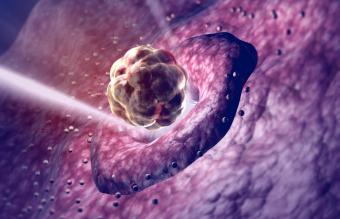
If you have recently experienced a miscarriage, understanding appropriate miscarriage aftercare can help you get through this stressful time in your life.
About Miscarriage
Miscarriages, medically referred to as spontaneous abortions, occur between 10 and 20 percent of all recognized pregnancies. A miscarriage does not necessarily mean a woman can't carry a pregnancy to term, as many women who have had a miscarriage go on to successfully give birth. Most miscarriages have no known cause and could not have been prevented.
Signs of a miscarriage include:
- White or pink mucus
- Brown or bright red bleeding
- Tissue being expelled from the vagina
- Contractions that are painful and between five and 20 minutes apart
- Back pain
- Loss of pregnancy symptoms
You should contact your healthcare provider if you have symptoms of a miscarriage, but it is important not to panic. The signs of miscarriage can also indicate other concerns that are not serious.
Types of Miscarriages
There are three different types of miscarriages that a woman may experience:
- Complete miscarriages occur when the embryo and products of pregnancy empty out of the uterus on their own. If a woman is in the very early stages of pregnancy, this type of miscarriage may occur before she even realizes she has conceived. Some women mistake a complete miscarriage for the arrival of their normal menstrual period.
- Inevitable or incomplete miscarriage occurs when the cervix is dilated and bleeding has begun, but no tissue has been expelled from the uterus. A dilation and curettage (D&C) will be necessary with this type of miscarriage.
- Missed miscarriages occur when embryonic death is not accompanied by expulsion of the products of pregnancy. The cervix remains closed and no bleeding is present, so this type of miscarriage is most often diagnosed after a woman notices an absence of previous pregnancy symptoms. A D&C will also be necessary with this type of miscarriage.
Tips for Miscarriage Aftercare
Your healthcare provider should explain the procedures for miscarriage aftercare, as the appropriate steps will vary depending upon how far along you are in your pregnancy, the type of miscarriage you have had, and your personal medical history. However, here are a few general tips to keep in mind during this time:
- Light bleeding and spotting after a miscarriage is normal. Use sanitary pads instead of tampons, however, as there is a risk of vaginal infection after a miscarriage.
- It is safe to have sex after all bleeding has stopped, although you should stop if intercourse causes pain or discomfort.
- Your period may return immediately after a miscarriage or you may need to wait six to seven weeks before your menstrual cycle resumes. In most cases, you should wait until you have had two or three normal periods before you try to get pregnant again. Ask your healthcare provider for additional details.
- Lactation may occur if your pregnancy lasted longer than 12 weeks. This is normal and should stop shortly.
- Many women feel tired and fatigued after a miscarriage. It is important to get plenty of rest during this time. It can take four to six weeks for your hormone levels to return to normal after a miscarriage.
Miscarriage Complications
In most cases, a woman recovers from a miscarriage relatively quickly and with no lasting complications. However, you should seek immediate medical attention if you notice any of the following:
- Fever
- Abdominal pain
- Foul smelling discharge
- Heavy vaginal bleeding
Emotional Effects of a Miscarriage
After a pregnancy loss, many women experience feelings of grief. You may also have the following symptoms:
- Unexpected crying
- Disturbed eating patterns
- Trouble sleeping
- Nightmares
- Mental confusion
Talking to a close friend or family member about your feelings may be helpful in dealing with the emotional effects of a miscarriage. You may also wish to communicate with other women who have experienced pregnancy loss through an online forum such as Miscarriage Support.
In some cases, especially if you have had a missed miscarriage, you may experience postpartum depression. This is a serious condition that you should discuss with your healthcare provider. Anti-depressants or therapy may be need as part of your miscarriage aftercare.







